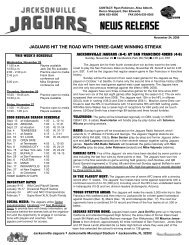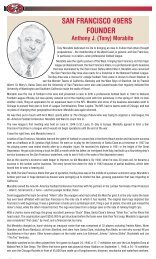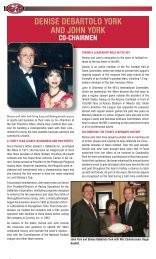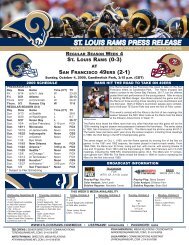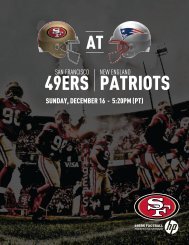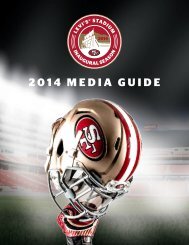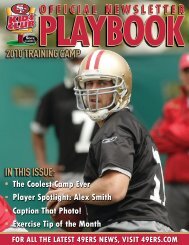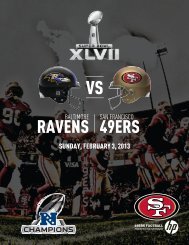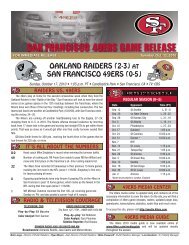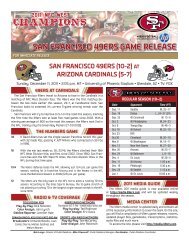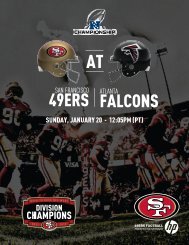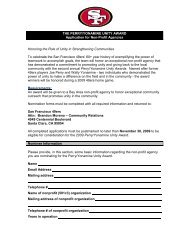HISTORYHISTORICAL HIGHLIGHTSship and Super Bowl XVI). The 49ers won 15 of theirlast 16 games, beat five opponents twice—includingall three postseason foes—and became the firstteam since Chicago in 1945-47 to go from the worst<strong>NFL</strong> record (2-14 in 1979) to the league’s best (13-3 in ’81) in just three seasons. All this happened withthree rookies (S Carlton Williamson, CB Eric Wrightand Lott) starting in the defensive secondary. Thosethree rookies, along with Montana, Clark, Cross, WRFreddie Solomon and Hicks, <strong>com</strong>bined with “oldveterans” Dean and LB Jack “Hacksaw” Reynolds,formed a nucleus of world championship vintage.1982As defending world champions, the San Francisco49ers did not enjoy the 1982 season, but then notmany <strong>NFL</strong> fans, coaches and players throughoutthe league did either (except maybe in Washington,where the Redskins were Super Bowl XVII champs).The Niners fell to 3-6 and missed out on the playoffs.In the strike-shortened season, San Franciscowent winless at home (0-5) but did manage a 3-1road record (the Niners were 0-2 prior to the 57-day players’ strike and 3-4 following it). WR DwightClark had an outstanding season, leading the <strong>NFL</strong>with 60 receptions and being named consensusAll-Pro and <strong>NFL</strong> Player of the Year by Sports Illustrated.LB Keena Turner (second-team All-Pro), SRonnie Lott (Pro Bowl), C Randy Cross (Pro Bowl), SDwight Hicks (Pro Bowl), T Keith Fahnhorst and QBJoe Montana (<strong>NFL</strong> record for five straight 300-yardpassing games) were bright spots in an otherwisedisappointing season.1983<strong>For</strong> the second time in three seasons, San Franciscoplayed in the NFC Championship Game. The’83 49ers were 10-6 (third best regular season victorytotal in club history) and NFC Western DivisionChampions (fifth time since 1970, second time since1981). In the playoffs, San Francisco squeezed pastDetroit, 24-23, but lost to Washington, 24-21, in theNFC Championship contest. Individual standouts includedQB Joe Montana (the league’s No. 1 all-timeQB entering the 1984 season), S Ronnie Lott (makinghis third Pro Bowl appearance in as many years),DE Fred Dean (leading the NFC in sacks with 17.5),DE Dwaine Board (second in sacks with 13), CB EricWright (team leader in interceptions with seven,two for scores), WR Dwight Clark (team leader with70 receptions and eight TDs), WR Freddie Solomon(club record 21.4 yards per catch), K Ray Wersching(team-record 126 points, including a perfect 51-of-51 PATs), offensive linemen C Randy Cross, T KeithFahnhorst and G John Ayers, RB Roger Craig (752yards rushing, 427 receiving), RB Wendell Tyler (856rushing yards, 285 receiving) and <strong>NFL</strong> All-Rookieteam pick LB Riki Ellison.1984The 49ers experienced the most successful regularseason in <strong>NFL</strong> history by winning a league record15 games, including all eight road contests—settingyet another <strong>NFL</strong> standard. The Niners broke 14 teamrecords in ’84, while be<strong>com</strong>ing the first NFC teamto sweep all of its conference games, and the firstNFC West unit to win all contests within the division.Led by RB Roger Craig and QB Joe Montana,San Francisco capped the year by routing the MiamiDolphins in Super Bowl XIX, 38-16. The win was the18th victory of the ’84 campaign, establishing an<strong>NFL</strong> standard for wins in a single season (includingplayoffs). San Francisco scored a then team-record475 points. The 49ers defense was the stingiest inthe <strong>NFL</strong> in ’84, allowing a league-low 227 pointsscored. Honors were numerous, including Pro Bowlrecognition for 10 of Bill Walsh’s charges—Montana,RB Wendell Tyler, T Keith Fahnhorst, C Randy Crossand C Fred Quillan on offense and S Dwight Hicks, SRonnie Lott, S Carlton Williamson and CB Eric Wright(the entire Niners secondary), and LB Keena Turneron defense.1985At 10-6, San Francisco qualified for postseason playfor the fourth time since 1981. Offensively, RB RogerCraig and WR Jerry Rice emerged as potent weaponsin the attack. Craig became the first <strong>NFL</strong> playerto surpass 1,000 yards rushing and receiving in thesame season. Rice was named NFC ROOKIE OF THEYEAR and set the team record for first-year playerswith 927 receiving yards. The defense experiencedthe influx of four new starters in ’85 (NT MichaelCarter, LB Todd Shell, LB Michael Walter and DE JohnHarty). Carter won a berth on the Pro Bowl team, asdid DBs Eric Wright and Carlton Williamson.1986The 49ers captured their fourth NFC Western Divisiontitle since 1981. Offensively, the team was led byAll-Pro wide receiver WR Jerry Rice, who paced the<strong>NFL</strong> with 1,570 receiving yards and 15 touchdowns.Those marks established club standards in additionto Rice’s team-record 16 total scores. The defensemanaged 49 takeaways, tying the Kansas City Chiefsfor <strong>NFL</strong> leadership. San Francisco’s 39 interceptionsand 578 return yards set team records, whilefive scores on interceptions returns tied another clubmark. S Ronnie Lott tied HB Dave Baker’s 1960 teamrecord with 10 interceptions. The output by youngplayers was vital due to major injuries suffered bymany starting veterans. San Francisco made 20 rostermoves during the season, shuffling players in andout of action. QB Joe Montana missed Weeks 2-9due to back surgery, while backup signal-caller JeffKemp did not play Weeks 8-11 due to a hip injury.1987The San Francisco 49ers marched to an <strong>NFL</strong> regularseason best 13-2 record. It marked a leagueleadingthird time in the decade of the ’80s that theteam either tied or posted the best win-loss percentageduring the regular season. San Francisco ledthe <strong>NFL</strong> with 5,987 total yards and was best amongleague defenders allowing 4,095 total yards. It wasthe first time in Niners history that the team led theleague in fewest total yards allowed. WR Jerry Riceset <strong>NFL</strong> records with 22 receiving touchdowns andscoring receptions in 13 consecutive games. Thedurable wide out received postseason Most ValuablePlayer awards from nearly every news agencyand sports publication. QB Joe Montana won the first<strong>NFL</strong> passing title of his nine-year career and set ateam record with 31 touchdown passes. S RonnieLott, Montana and Rice were joined by NT MichaelCarter and RB Roger Craig on the NFC squad in the1988 Pro Bowl.SAN FRANCISCO 49ERS \\379// MEDIA GUIDE1988The 49ers climaxed their 1988 season in thrillingfashion with a dramatic touchdown drive in thewaning seconds of Super Bowl XXIII. QB Joe Montana’s10-yard scoring toss to WR John Taylor with34 seconds remaining in the contest gave the Ninerstheir third Super Bowl win of the decade and therights to the title “Team of the 1980s.” The worldchampionship game against the Cincinnati Bengalswas a microcosm of the entire ’88 campaign. SanFrancisco opened the year strong with a 5-2 record,but by Week 12 were 6-5, two games out of firstplace with only five contests to play. That week’svictory over Washington launched a four-gamewinning streak that resulted in the Niners moving upfrom third to first place in the NFC West standingsand earning a third consecutive NFC Western Divisiontitle. As the season ended RB Roger Craig brokethe team’s single season rushing record (finishingwith 1,502 yards) and K Mike Cofer establishednew Niners single-season standards for field goalsattempted (38) and made (27). WR Jerry Rice wenton a playoff tear that included: an <strong>NFL</strong> postseasonrecord-tying three touchdown receptions againstMinnesota, the Montana-to-Rice battery hookedupon first half touchdowns of 61 and 27 yards atChicago, and concluded with a Super Bowl XXIII MVPperformance of 11 receptions for a Super Bowl record215 yards and a touchdown. Defenders S RonnieLott, DE Charles Haley, NT Michael Carter, alongwith Rice, Taylor and Craig, were selected to the ProBowl.1989George Seifert was named head coach of the SanFrancisco 49ers just four days after the team hadwon its third World Championship under retiring headman Bill Walsh. Seifert’s quest for the title was testedearly and often as the 49ers endured nail-bitingwins at Indianapolis (30-24) and Tampa Bay (20-16) to open the season. QB Joe Montana threw for428 yards and five touchdowns, including a teamrecordfour TD tosses in the fourth quarter resultingin a 10-point victory (38-28) in Philadelphia. Underfirst-year offensive coordinator Mike Holmgren, theNiners accumulated more yardage than any other<strong>NFL</strong> team. WRs Jerry Rice and John Taylor, RB RogerCraig, G Guy McIntyre and QB Joe Montana were1990 Pro Bowl participants. Rice’s 1,483 receivingyards paced the league. Craig exceeded 1,000 yardsrushing for the second consecutive season and runningmate FB Tom Rathman led NFC running backswith 73 receptions. Montana had the best season ofhis career. A consensus Player of the Year, Montana’s112.4 quarterback rating set a then <strong>NFL</strong> single-seasonrecord. Montana was selected by his teammatesas the ’89 recipient of the Len Eshmont Award. Fueledby Rice’s 72-yard first quarter catch-and-runfor a score, the 49ers exploded for 27 first half pointsand cruised to a 41-13 victory against Minnesotain their opening ’89 playoff contest. The 49ers facedLos Angeles in the NFC Championship Game. TheNiners started slowly, however. Two long, secondquarterscoring drives and a touchdown set up byan interception gave San Francisco a 21-3 lead atintermission. Cofer’s three field goals cushionedSan Francisco’s lead as the team advanced to SuperBowl XXIV with a satisfying 30-3 win. The 49ersdisplayed optimal performance at the highest level of
HISTORYHISTORICAL HIGHLIGHTS<strong>com</strong>petition while securing their second consecutiveWorld Championship. The resounding 55-10 defeatof the Denver Broncos in Super Bowl XXIV was aconvergence of talent and technique, planning andpurpose. San Francisco tied or set nearly 40 SuperBowl records and Montana was honored with thegame’s MVP award for an unprecedented third time.1990The Niners finished the season with an <strong>NFL</strong>-best14-2 mark and came within four seconds (in a15-13 loss to the NY Giants) of earning their thirdconsecutive trip to the Super Bowl. In addition to recordingthe <strong>NFL</strong>’s best win-loss mark for the secondstraight season, the 49ers captured the NFC WesternDivision title for the fifth consecutive year and theeighth time since 1981 (’81, 1983-84, 1986-90).San Francisco claimed its 11th Division crown sincethe <strong>NFL</strong>/AFL merger of 1970, more than any NFCWestern Division opponent (the Rams were secondwith eight), and second most in <strong>NFL</strong> history (behindMiami’s 13 AFC East titles). San Francisco openedthe 1990 season with a team-record 10 consecutivevictories. The 49ers also posted an 8-0 mark on theroad, giving them the longest road winning streakin league history (19 games, including postseason)heading into ’91. QB Joe Montana and WR Jerry Riceagain formed one of the most prolific aerial <strong>com</strong>binationsin pro football. Montana, who was named 1990Sportsman of the Year by Sports Illustrated, finishedhis 12th <strong>NFL</strong> season by throwing for a then teamrecord3,944 yards. He also tossed 26 touchdownpasses (second in the NFC) and finished as the thirdhighest rated quarterback in the conference. On thereceiving end of many of those Montana passes wasRice, who became only the fourth player in leaguehistory to reach the century mark in receptions for asingle season. Rice hauled in 100 passes for 1,502yards and 13 TDs, and earned his fifth consecutivetrip to the Pro Bowl. In one of the most memorableperformances of the season (if not team history),Rice tied an <strong>NFL</strong> record with five TD receptions in a45-35 victory at Atlanta, October 14. The defensiveside of the ball was led by LB-DE Charles Haley’s 58tackles and an NFC-high 16 sacks. <strong>For</strong> his efforts,the fourth-year player from James Madison Universitywas named as a starter in the 1991 Pro Bowl.LB Bill Romanowski led the team in tackles with 79,while CB Darryl Pollard registered 74, including ateam-high 72 solo stops. A number of team careerrecords fell by the wayside in ’90. Montana slippedpast QB John Brodie to take over the career passinglead (34,998 yards), while RB Roger Craig becamethe all-time team record holder in career receptionswith 508, moving ahead of WR Dwight Clark’s totalof 506. The 49ers placed five players on the 1991NFC Pro Bowl squad, four as starters. Representingthe 49ers were Haley, Rice, S Ronnie Lott and G GuyMcIntyre, while Montana, selected as a starter, wasunable to participate because of a finger injury sufferedin the NFC Championship Game.1991It was a classic case of “too little...too late” for theSan Francisco 49ers in 1991. After losing six of theirfirst 10 games by a total of 26 points, the Niners wontheir remaining six contests (by a total of 95 points)but missed the playoffs for the first time since 1982.The 49ers finished the 1991 campaign in impressivefashion during that final six-game span, witha margin of victory that averaged almost 16 points.During that final six-game span, the Niners defeatedthree playoff teams (New Orleans, Kansas City andChicago) while averaging 31.5 points per gamein the process. WR Jerry Rice continued to registerhis place in club and league history taking overthe club’s career receiving record with 525 catches.Rice finished third in the NFC with 80 receptions and1,206 yards, surpassing 1,000 receiving yards for aclub-record sixth consecutive season, and he ledthe <strong>NFL</strong> with 14 TD receptions. QB Steve Young wonthe <strong>NFL</strong> passing title, despite missing six games dueto a knee injury. Young, who passed for 2,517 yardsand 17 TDs, finished with a 101.8 rating, bestingWashington’s Mark Rypien (97.9) for the title. WhenYoung was injured at Atlanta November 3, QB SteveBono (1,617 yards, 11 TDs) came off the bench torally the team to five consecutive victories. On thedefensive side of the ball, S Dave Waymer finishedas the leader in total tackles (86), solo tackles (77),interceptions (4), interception return yards (78) andpasses defensed (16) and tied CB Kevin Lewis for thelead in forced fumbles (3). LB-DE Charles Haley andDE Larry Roberts each posted seven sacks, whileCB Don Griffin’s 99-yard fumble return against theBears set a team record and was the third longestreturn in league history. San Francisco placed threeplayers on the 1992 NFC Pro Bowl squad, two asstarters, as Rice, Guy McIntyre and Haley were allselected (Rice and McIntyre as starters). It was thesixth time in Rice’s seven-year career that he wasselected to play on the islands. McIntyre and Haleywere each selected for the third time.1992The San Francisco 49ers continued their winningtradition as they once again posted the <strong>NFL</strong>’s bestregular season record (14-2), while winning theirsixth NFC Western Division title in seven years, andadvancing to the NFC Championship Game for thesecond time in three seasons. In the NFC DivisionalPlayoffs, the 49ers defeated defending Super BowlChampion Washington (20-13). However, San Franciscofell to Dallas, 30-20, in the NFC ChampionshipGame at Candlestick Park the following week.WR Jerry Rice continued to etch his name in footballhistory, be<strong>com</strong>ing the <strong>NFL</strong>’s all-time touchdownreception leader with 103. He tied Steve Largent’smark of 100 in Week 13 against the PhiladelphiaEagles (11-29), then broke the record the followingweek vs. the Miami Dolphins (12-6). QB SteveYoung, who harvested a total of 34 awards, includingthe <strong>NFL</strong>’S Most Valuable Player Award, won the <strong>NFL</strong>passing title for the second straight year, finishing anamazing 16.3 points ahead of his closest <strong>com</strong>petitor.Young, who passed for 3,465 yards and 25 TDs, finishedwith a 107.0 rating. Following his 101.8 ratingin 1991, it marked the first time in league historythat anyone had posted back-to-back seasons withratings higher than 100 each year. RB Ricky Wattersgained 1,013 yards to establish a team rushing recordfor first-year backs. K Mike Cofer’s 107 pointsled the 49ers in scoring for the fifth consecutive year.On the defensive side of the ball, linebacking led thecharge as LB Bill Romanowski finished as the leaderin total tackles (80) and assists (15). LB Mike Walter(67 solo stops) and LB Tim Harris (17 sacks for 116yards) also led defensive categories. CB Don GriffinSAN FRANCISCO 49ERS \\380// MEDIA GUIDEpaced the defensive backfield with five interceptionsand 19 passes defensed. Fans at Candlestick sawthe Niners rewrite part of the team’s record book in’92 as they set team marks for total offense (598yards) vs. the Buffalo Bills (Sept. 13) and points (56)in their win over the Atlanta Falcons (56-17, 10-18).San Francisco placed seven players on the 1993NFC Pro Bowl squad, including four starters and fivefirst-time participants. Rice, G Guy McIntyre, DTPierce Holt and Young were all named as starters. TEBrent Jones, Watters and T Steve Wallace were alsoselected. It was the seventh time in Rice’s eightyearcareer that he was selected to play on the islandsand McIntyre was named for the fourth time,while the others made their first visits.1993The 1993 season was another in a long line of successesfor the San Francisco 49ers. Among the team’sac<strong>com</strong>plishments were: a 10-6 record, marking an<strong>NFL</strong>-record 11th consecutive season with 10 ormore victories, the team’s 10th NFC West title in 13seasons and a third appearance in four years in theNFC title game. In addition, San Francisco led theNational Football League in scoring and total offenseand established or tied five of the team’s nine majoroffensive records. The marks set included mostnet offensive yards (6,435), most TDs (61), most firstdowns (372) and highest average gain per play (6.3).The Niners also tied the team mark for net passingyards in a season with 4,302, equaling the recordset in 1989. Individually, QB Steve Young became thefirst player in <strong>NFL</strong> history to lead the <strong>NFL</strong> in passingthree consecutive seasons, when he posted a 101.5rating in 1993. In addition, it was his third consecutiveseason with a rating over 100, also a league first.Young <strong>com</strong>pleted 68 percent of his passes (secondhighest in team history) for a then club-record 4,023yards. His 29 scoring passes in ’93 ranked third onthe team’s single-season charts. RB Ricky Wattersled the ground game for the second consecutiveseason, narrowly missing the 1,000-yard mark with950 yards. Watters posted 10 rushing TDs during theseason and set an <strong>NFL</strong> single-game playoff recordwith a five-touchdown outburst vs. the New YorkGiants. WR Jerry Rice posted one of his best seasons,recording 98 receptions for 1,503 yards and15 touchdowns on his way to being named <strong>NFL</strong> OF-FENSIVE PLAYER OF THE YEAR by Associated Press.He also received the team’s Len Eshmont Award.Defensively, DT Dana Stubblefield was named the<strong>NFL</strong> DEFENSIVE ROOKIE OF THE YEAR, capping aseason in which he registered 10.5 sacks. LB BillRomanowski (105) and S Tim McDonald (91) toppedthe team in tackles. Young, Rice and McDonald wereselected to the Pro Bowl, joining T Harris Barton, GGuy McIntyre, TE Brent Jones and C Jesse Sapoluwith that honor.1994The 1994 San Francisco 49ers <strong>com</strong>pleted one of themost impressive seasons in <strong>NFL</strong> history by capturingtheir <strong>NFL</strong>-record fifth Super Bowl Championship atJoe Robbie Stadium in Miami. San Francisco defeatedthe San Diego Chargers 49-26 in Super Bowl XXIXto put the finishing touches on a 16-3 season andwin an unprecedented fifth Vince Lombardi Trophy.The offseason started on a high note. Despite facingan <strong>NFL</strong>-imposed salary cap in 1994, the 49ers
- Page 2 and 3:
2011 SAN FRANCISCO 49ERS SCHEDULE &
- Page 4 and 5:
OFFICE OF THE OWNERDenise DeBartolo
- Page 6 and 7:
CO-CHAIRMENDENISE & JOHN YORKIn rec
- Page 8 and 9:
Trent Baalke enters his seventh sea
- Page 10 and 11:
Jeff Ferguson is in his sixth year
- Page 12 and 13:
Attack each day with an enthusiasm
- Page 14 and 15:
ALL-TIME 49ERS HEAD COACHING RECORD
- Page 16 and 17:
Greg Roman is in his first year wit
- Page 18 and 19:
With an extensive coaching backgrou
- Page 20 and 21:
Michael Christianson is in his firs
- Page 22 and 23:
A former NFL tight end, Reggie Davi
- Page 24 and 25:
With an extensive collegiate coachi
- Page 26 and 27:
Ejiro Evero (eeh-JEE-row EV-uh-row)
- Page 28 and 29:
Greg Jackson is in his first season
- Page 30 and 31:
John Morton is in his first year wi
- Page 32 and 33:
Mike Solari rejoined the 49ers in 2
- Page 34 and 35:
Jim Tomsula is in his fifth season
- Page 36 and 37:
Mark Uyeyama (ooh-ee-YAH-muh) is in
- Page 38 and 39:
PLAYERSPRONUNCIATIONNaVorro Bowman
- Page 40 and 41:
MARTZ, Mike - (Fresno State)Offensi
- Page 42 and 43:
Justin Chabot is in his eighth year
- Page 44 and 45:
Ethan Waugh is in his eighth year w
- Page 46 and 47:
Nate Breske is in his third year as
- Page 48 and 49:
Scott Rotier is in his fourth year
- Page 50 and 51:
QUARTERBACKS3 Scott Tolzien QB 6-3
- Page 52 and 53:
PLAYER BIO// CAREER HIGHLIGHTS• A
- Page 54 and 55:
PLAYER BIODAVID AKERS// 2001 (PHILA
- Page 56 and 57:
PLAYER BIODAVID AKERS2000 (Philadel
- Page 58 and 59:
PLAYER BIODAVID AKERS2009 (Philadel
- Page 60 and 61:
PLAYER BIO6-7 | 328 | OHIO ST. | 2N
- Page 62 and 63:
BOWMAN’S GAME-BY-GAMEPLAYER BIO20
- Page 64 and 65:
PLAYER BIO6-3 | 259 | VIRGINIA | 6T
- Page 66 and 67:
PLAYER BIOAHMAD BROOKS2006 (Cincinn
- Page 68 and 69:
PLAYER BIO// 2007• Suffered a tor
- Page 70 and 71:
PLAYER BIO6-4 | 264 | PITTSBURGH |
- Page 72 and 73:
PLAYER BIO6-1 | 235 | LAYFAYETTE |
- Page 74 and 75:
PLAYER BIO6-1 | 214 | TEXAS TECH |
- Page 76 and 77:
PLAYER BIO6-0 | 199 | SOUTH CAROLIN
- Page 78 and 79:
PLAYER BIO6-3 | 250 | MARYLAND | 6T
- Page 80 and 81:
PLAYER BIOVERNON DAVIS// COLLEGEFin
- Page 82 and 83:
PLAYER BIO6-1 | 233 | MISSISSIPPI S
- Page 84 and 85:
PLAYER BIO6-6 | 275 | GEORGIA | ROO
- Page 86 and 87:
PLAYER BIO// 2006 (CLEVELAND)• No
- Page 88 and 89:
PLAYER BIOBRAYLON EDWARDS2009 (Clev
- Page 90 and 91:
PLAYER BIO// COLLEGEA three-year le
- Page 92 and 93:
PLAYER BIOTED GINN JR.2009 Receivin
- Page 94 and 95:
PLAYER BIODASHON GOLDSON// PERSONAL
- Page 96 and 97:
PLAYER BIO6-1 | 242 | MIAMI | 4TH Y
- Page 98 and 99:
PLAYER BIO6-3 | 318 | MICHIGAN | 10
- Page 100 and 101:
PLAYER BIO5-9 | 217 | MIAMI | 7TH Y
- Page 102 and 103:
PLAYER BIOFRANK GORE// 2006• Name
- Page 104 and 105:
PLAYER BIO6-1 | 251 | OHIO ST. | 3R
- Page 106 and 107:
PLAYER BIO6-0 | 255 | TENNESSEE | 6
- Page 108 and 109:
PLAYER BIOPARYS HARALSON2008Date Op
- Page 110 and 111:
PLAYER BIO5-7 | 199 | OKLAHOMA ST |
- Page 112 and 113:
PLAYER BIO6-3 | 295 | LOUISIANA ST.
- Page 114 and 115:
PLAYER BIO6-5 | 242 | ARIZONA ST. |
- Page 116 and 117:
PLAYER BIO6-0 | 208 | TEXAS CHRISTI
- Page 118 and 119:
PLAYER BIO6-3 | 308 | APPALACHIAN S
- Page 120 and 121:
PLAYER BIO// 2007• Earned Pro Bow
- Page 122 and 123:
PLAYER BIOANDY LEE2009Date Opp W/L
- Page 124 and 125:
PLAYER BIO// COLLEGESaw action in 4
- Page 126 and 127:
PLAYER BIO6-2 | 248 | CENTRAL FLORI
- Page 128 and 129:
2008• All 3 of his receiving TDs
- Page 130 and 131:
PLAYER BIO6-1 | 250 | KANSAS | 11TH
- Page 132 and 133:
PLAYER BIOMORAN NORRISRushes: 3 (2
- Page 134 and 135:
PLAYER BIO6-4 | 299 | MONTANA ST. |
- Page 136 and 137:
PLAYER BIO6-0 | 192 | AUBURN | 7TH
- Page 138 and 139:
PLAYER BIOCARLOS ROGERS2008 (Washin
- Page 140 and 141:
PLAYER BIO6-4 | 217 | UTAH | 7TH YE
- Page 142 and 143:
PLAYER BIOALEX SMITH// INJURY REPOR
- Page 144 and 145:
PLAYER BIO6-4 | 285 | MISSOURI | 11
- Page 146 and 147:
PLAYER BIOJUSTIN SMITHTotal Tackles
- Page 148 and 149:
PLAYER BIO6-1 | 200 | OKLAHOMA | 4T
- Page 150 and 151:
PLAYER BIO6-6 | 325 | OREGON | 7TH
- Page 152 and 153:
PLAYER BIO6-2 | 330 | HAWAII | 8TH
- Page 154 and 155:
PLAYER BIOISAAC SOPOAGA2007Date Opp
- Page 156 and 157:
PLAYER BIO// 2005• Posted career-
- Page 158 and 159:
PLAYER BIO6-0 | 199 | MARSHALL | 3R
- Page 160 and 161:
PLAYER BIO6-5 | 315 | CENTRAL MICHI
- Page 162 and 163:
PLAYER BIO6-3 | 208 | WISCONSIN | R
- Page 164 and 165:
PLAYER BIOWILL TUKUAFUTUKUAFU’S C
- Page 166 and 167:
PLAYER BIODELANIE WALKER// COLLEGEB
- Page 168 and 169:
PLAYER BIO5-10 | 208 | OHIO ST. | 6
- Page 170 and 171:
PLAYER BIODONTE WHITNER2008 (Buffal
- Page 172 and 173:
PLAYER BIO5-10 | 186 | ARIZONA ST.
- Page 174 and 175:
PLAYER BIO6-1 | 203 | MARYLAND | 8T
- Page 176 and 177:
PLAYER BIOMADIEU WILLIAMS2004 (Cinc
- Page 178 and 179:
PLAYER BIO6-1 | 240 | MISSISSIPPI |
- Page 180 and 181:
PLAYER BIOPATRICK WILLIS// 2007•
- Page 182 and 183:
2010 IN REVIEWTEAM STATISTICSDate W
- Page 184 and 185:
2010 IN REVIEWPARTICIPATION CHARTSE
- Page 186 and 187:
2010 IN REVIEW1-1 Signed K Shane An
- Page 188 and 189:
2010 IN REVIEWOFFENSIVE TEAM STATSa
- Page 190 and 191:
2010 IN REVIEWGAME SUMMARIESGAME1Th
- Page 192 and 193:
2010 IN REVIEWGAME SUMMARIESGAME3Th
- Page 194 and 195:
2010 IN REVIEWGAME SUMMARIESGAME5Th
- Page 196 and 197:
2010 IN REVIEWGAME SUMMARIESGAME7Th
- Page 198 and 199:
2010 IN REVIEWGAME SUMMARIESGAME9Th
- Page 200 and 201:
2010 IN REVIEWGAME SUMMARIESGAME11M
- Page 202 and 203:
2010 IN REVIEWGAME SUMMARIESGAME13W
- Page 204 and 205:
2010 IN REVIEWGAME SUMMARIESGAME15W
- Page 206 and 207:
RECORDSMOST SEASONS PLAYEDPlayerSea
- Page 208 and 209:
RECORDSALL-TIME REGULAR SEASON SCOR
- Page 210 and 211:
TOP SINGLE-GAME PASSINGMOST PASSING
- Page 212 and 213:
RECORDSALL-TIME REGULAR SEASON RUSH
- Page 214 and 215:
RECORDSALL-TIME REGULAR SEASON RECE
- Page 216 and 217:
RECORDSALL-TIME REGULAR SEASON SCRI
- Page 218 and 219:
RECORDSALL-TIME SACK LEADERSPlayer
- Page 220 and 221:
RECORDSALL-TIME REGULAR SEASON KICK
- Page 222 and 223:
RECORDSNFL RECORDS HELD BY 49ERSMos
- Page 224 and 225:
RECORDSINDIVIDUAL RECORDSROOKIE SEA
- Page 226 and 227:
RECORDSCAREER 100-YARD RUSHING GAME
- Page 228 and 229:
RECORDS136 - Brian Westbrook at Arz
- Page 230 and 231:
RECORDS149 - Jerry Rice at NO 10/8/
- Page 232 and 233:
RECORDSALL-TIME BLOCKED FIELD GOALS
- Page 234 and 235:
RECORDSINDIVIDUAL RECORDS49ERS YEAR
- Page 236 and 237:
RECORDSKICKOFF RETURNS (BASED ON AV
- Page 238 and 239:
RECORDSINDIVIDUAL RECORDS49ERS YEAR
- Page 240 and 241:
RECORDSTEAM RECORDSSCORINGMost Poin
- Page 242 and 243:
RECORDSTEAM RECORDS49ERS SINGLE-GAM
- Page 244 and 245:
POSTSEASONHISTORY49ERS POSTSEASON H
- Page 246 and 247:
POSTSEASONINDIVIDUAL RECORDS49ERS S
- Page 248 and 249:
POSTSEASONTEAM RECORDS49ERS TEAM NF
- Page 250 and 251:
198149ers 38, New York Giants 24NFC
- Page 252 and 253:
198849ers 34, Minnesota Vikings 9NF
- Page 254 and 255:
POSTSEASONGAME SUMMARIES1992Dallas
- Page 256 and 257:
199649ers 14, Philadelphia Eagles 0
- Page 258 and 259:
2001Green Bay Packers 25, 49ers 15N
- Page 260 and 261:
ALL-TIME RESULTS1950 (3-9)Lawrence
- Page 262 and 263:
ALL-TIME RESULTS1952 (7-5)Lawrence
- Page 264 and 265:
ALL-TIME RESULTS1954 (7-4-1)Lawrenc
- Page 266 and 267:
ALL-TIME RESULTS1956 (5-6-1)Frank C
- Page 268 and 269:
ALL-TIME RESULTS1958 (6-6)Frank C.
- Page 270 and 271:
ALL-TIME RESULTS1960 (7-5)Howard W.
- Page 272 and 273:
ALL-TIME RESULTS1962 (6-8)Howard W.
- Page 274 and 275:
ALL-TIME RESULTS1964 (4-10)Jack Chr
- Page 276 and 277:
ALL-TIME RESULTSYEAR-BY-YEAR STATS1
- Page 278 and 279:
ALL-TIME RESULTS1968 (7-6-1)Dick No
- Page 280 and 281:
ALL-TIME RESULTS1970 (10-3-1/11-4-1
- Page 282 and 283:
ALL-TIME RESULTS1972 (8-5-1/8-6-1)N
- Page 284 and 285:
ALL-TIME RESULTS1974 (6-8)Dick Nola
- Page 286 and 287:
ALL-TIME RESULTS1976 (8-6)Monte Cla
- Page 288 and 289:
ALL-TIME RESULTSYEAR-BY-YEAR STATS1
- Page 290 and 291:
ALL-TIME RESULTS1980 (6-10)Bill Wal
- Page 292 and 293:
ALL-TIME RESULTS1982 (3-6)Bill Wals
- Page 294 and 295:
ALL-TIME RESULTSYEAR-BY-YEAR STATS1
- Page 296 and 297:
ALL-TIME RESULTSYEAR-BY-YEAR STATS1
- Page 298 and 299:
ALL-TIME RESULTS1988 (10-6/13-6)NFC
- Page 300 and 301:
ALL-TIME RESULTSYEAR-BY-YEAR STATS1
- Page 302 and 303:
ALL-TIME RESULTS1992 (14-2/15-3)NFC
- Page 304 and 305:
ALL-TIME RESULTSYEAR-BY-YEAR STATS1
- Page 306 and 307:
ALL-TIME RESULTSYEAR-BY-YEAR STATS1
- Page 308 and 309:
ALL-TIME RESULTS1998 (12-4/13-5)Ste
- Page 310 and 311:
ALL-TIME RESULTS2000 (6-10)Steve Ma
- Page 312 and 313:
ALL-TIME RESULTS2002 (10-6/11-7)NFC
- Page 314 and 315:
ALL-TIME RESULTSYEAR-BY-YEAR STATS2
- Page 316 and 317:
ALL-TIME RESULTS2006 (7-9)Mike Nola
- Page 318 and 319:
ALL-TIME RESULTSYEAR-BY-YEAR STATS2
- Page 320 and 321:
ALL-TIME RESULTSYEAR-BY-YEAR STATS2
- Page 322 and 323:
ALL-TIME RESULTSRECORD VS. OPPONENT
- Page 324 and 325:
ALL-TIME RESULTSRECORD VS. OPPONENT
- Page 326 and 327:
ALL-TIME RESULTSRECORD VS. OPPONENT
- Page 328 and 329:
ALL-TIME RESULTSRECORD VS. OPPONENT
- Page 330 and 331: ALL-TIME RESULTSPRIMETIME GAMESPrim
- Page 332 and 333: ALL-TIME RESULTSMNF RECORDS49ERS MO
- Page 334 and 335: October 31, 1976St. Louis 23, San F
- Page 336 and 337: ALL-TIME RESULTSOVERTIME GAMESDecem
- Page 338 and 339: ALL-TIME RESULTSOVERTIME GAMESJanua
- Page 340 and 341: ALL-TIME RESULTSPRESEASON RESULTSPR
- Page 342 and 343: ALL-TIME RESULTSPRESEASON RESULTS19
- Page 344 and 345: ALL-TIME RESULTSNFC WEST STANDINGSN
- Page 346 and 347: HISTORYSAN FRANCISCO 49ERSLIMITED P
- Page 348 and 349: HISTORYGARRY NIVER AWARDThe Garry N
- Page 350 and 351: HISTORY49ERS HALL OF FAMEEDWARD J.
- Page 352 and 353: HISTORY49ERS HALL OF FAMEEDWARD J.
- Page 354 and 355: HISTORYPRO BOWLERS1950 (JAN. 14, 19
- Page 356 and 357: HISTORY1988 — Michael Carter NT (
- Page 358 and 359: HISTORYUNRESTRICTED FREE AGENTS SIG
- Page 360 and 361: 1981QB Guy Benjamin from NO for 198
- Page 362 and 363: HISTORYALL-TIME ROSTERALast First P
- Page 364 and 365: HISTORYLast First Position College
- Page 366 and 367: HISTORYALL-TIME ROSTERLast First Po
- Page 368 and 369: HISTORYALL-TIME ROSTERLast First Po
- Page 370 and 371: HISTORYLast First Position College
- Page 372 and 373: HISTORY49ERS STARTERSLLB 55 Matt Ha
- Page 374 and 375: HISTORY49ERS STARTERSLLB 52 Skip Va
- Page 376 and 377: HISTORY49ERS STARTERSSS 46 Tim McDo
- Page 378 and 379: 1949December 10, the NFL and AAFC a
- Page 382 and 383: HISTORYHISTORICAL HIGHLIGHTSstill m
- Page 384 and 385: HISTORYHISTORICAL HIGHLIGHTScareer
- Page 386 and 387: HISTORYHISTORICAL HIGHLIGHTSyards o
- Page 388 and 389: HISTORYPRESIDENTS/PERSONNELSAN FRAN
- Page 390 and 391: DRAFT HISTORYALL-TIME DRAFT1953(Jan
- Page 392 and 393: DRAFT HISTORYALL-TIME DRAFT13. Greg
- Page 394 and 395: DRAFT HISTORYALL-TIME DRAFT9. Choic
- Page 396: DRAFT HISTORYALL-TIME DRAFT7. Choic



